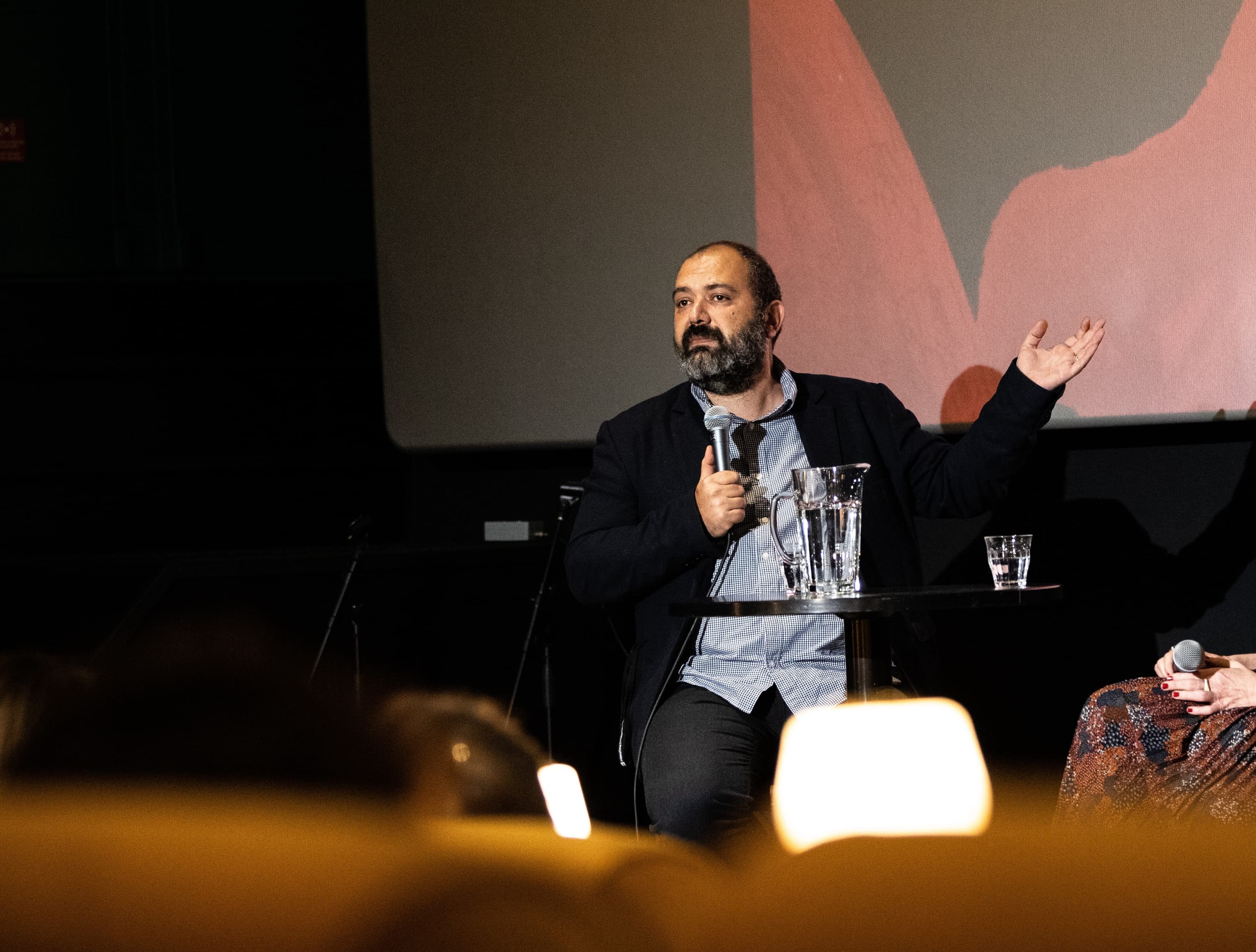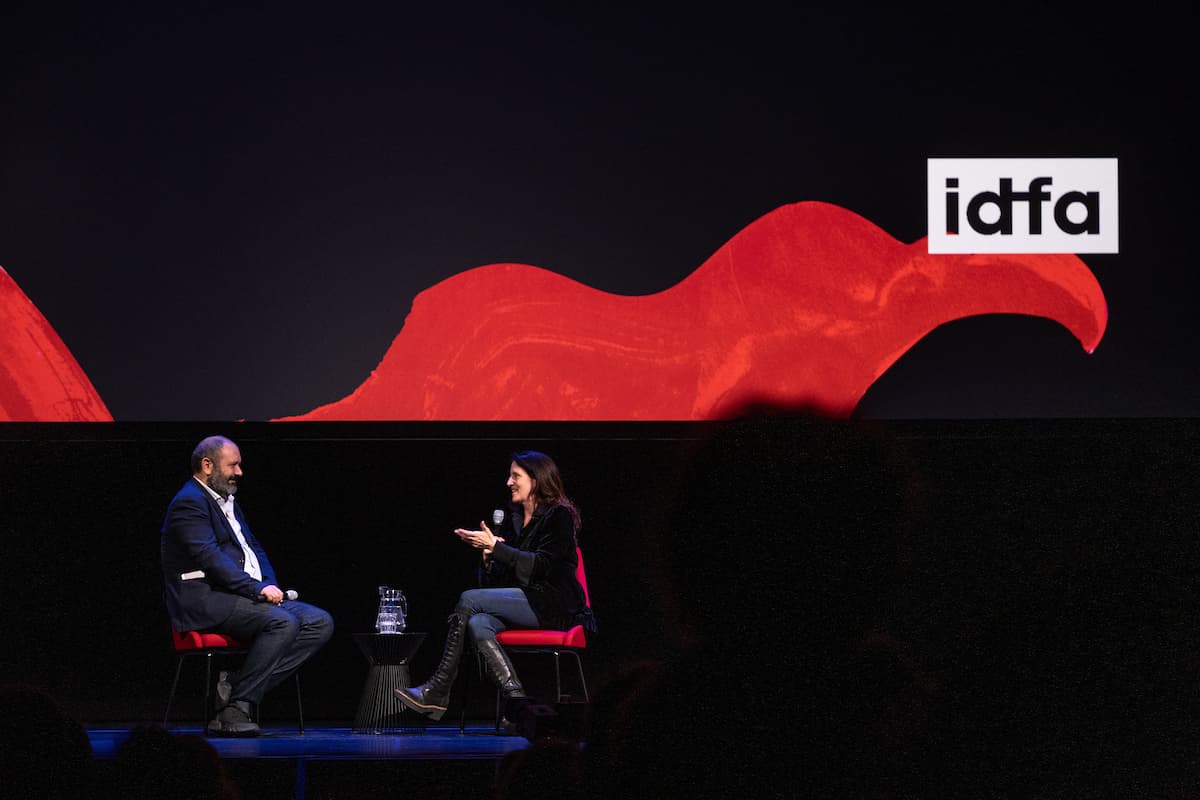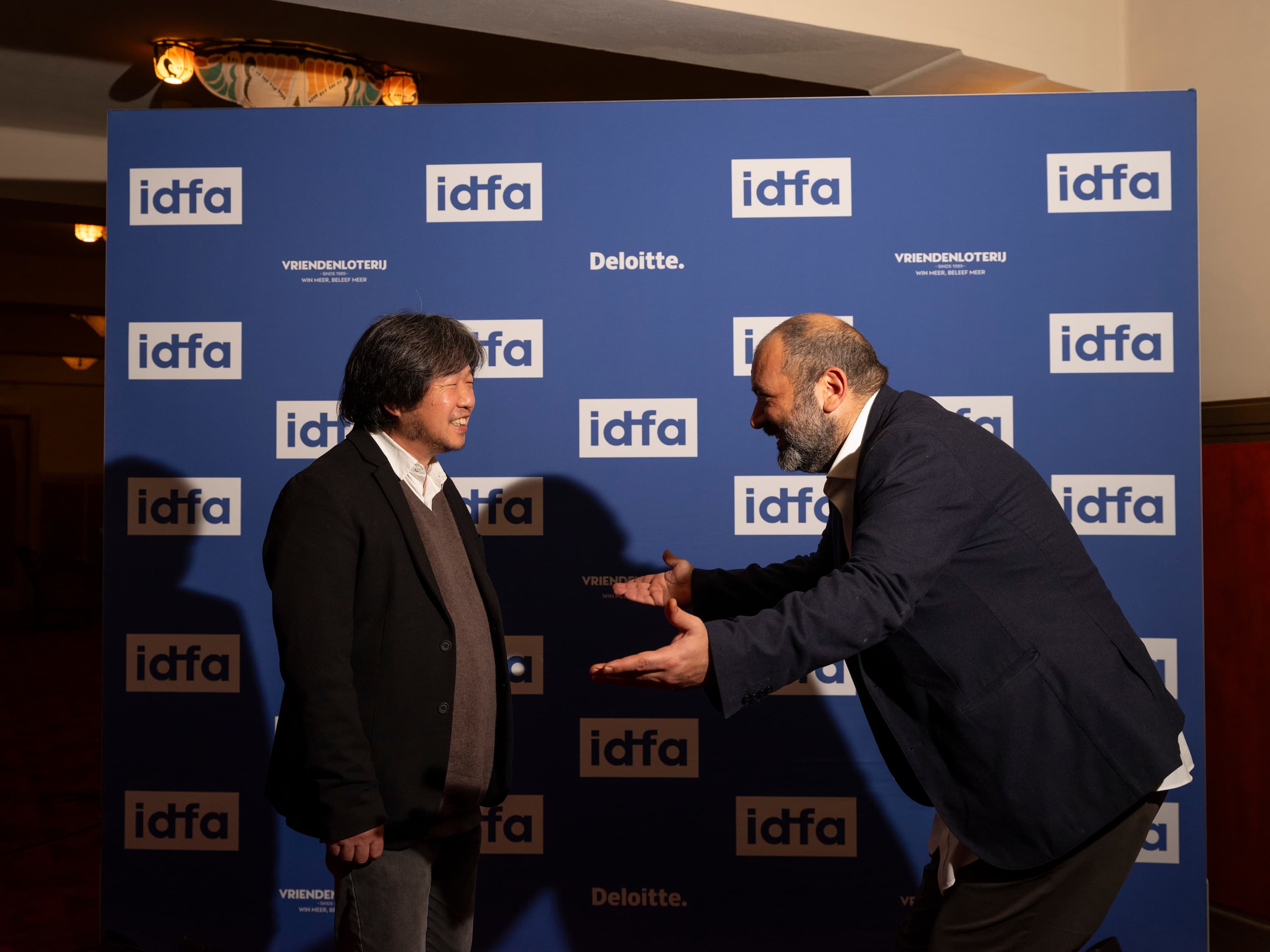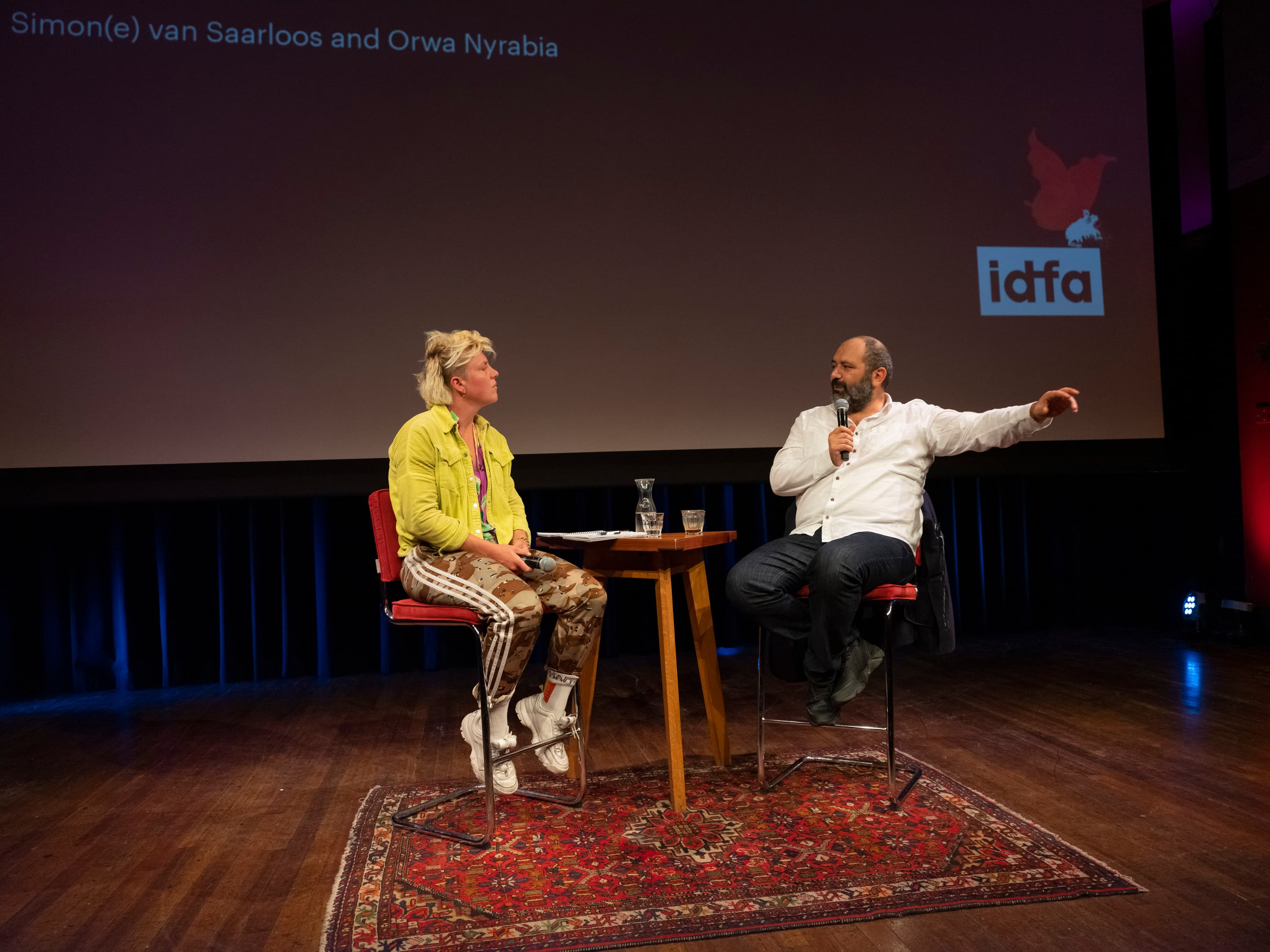
Reflecting on Orwa Nyrabia’s years of artistic leadership
After seven years at the helm, Orwa Nyrabia is stepping down as IDFA’s Artistic Director—a moment to reflect on a tenure marked by his thoughtful and unmistakable imprint on the festival.
To lead an international documentary festival like IDFA is to walk a careful line between vision and openness. It is a role that demands both direction and deep listening—a willingness to shape, while also making space. The artistic director must set a curatorial tone, define priorities, and engage with the urgencies of the moment. But just as crucial is the capacity to remain porous: to welcome new voices, respond to a rapidly shifting world, and recognize the brilliance of ideas not one’s own.
“When I look back on my first edition,” he says, “I remember mostly how driven I felt. I wasn’t just trying to prove myself to others—I had to prove to myself that I could do this. I watched an unhealthy number of films in my first two years. It was obsessive: films before breakfast, that sort of thing. I wanted to learn everything. And while I was very worried inside, I made sure to project confidence.”
That tension—between internal uncertainty and outward steadiness—shaped his early approach. “I didn’t want the team to feel like I was hesitant or insecure. I thought, if I’m stepping into this role, I need to be reassuring. So I made a very conscious decision not to implement any big changes in that first year. I wanted to go through the full cycle once, observe the process, and only then begin to shape ideas.”

Orwa with Guest of Honor Laura Poitras, 2022
After a year of observing and learning, Orwa began shaping his artistic vision for IDFA. But rather than opting for swift reform, he committed to a gradual, collaborative process of change. "I thought there should be a third way," he explains. "Not a director who imposes everything overnight, nor someone who simply maintains the status quo—but someone who builds change slowly, in dialogue with others. So even the things I’m most proud of now are not exactly as I imagined them. They’ve been shaped collectively."
This meant that nothing was implemented top-down. Even structural changes, like moving from isolated programming roles to a more collaborative system, took years of patient negotiation. "It took four years to restructure the team and rethink how we compose the program," he says. “But it allowed us to arrive at something that feels truly shared.”
One example was the realization that the ‘Masters’ section skewed heavily male and Western – prompting a reevaluation of how prestige is framed, and how IDFA could shift toward a more equitable representation. The section was renamed as 'Signed', and described as the “latest films by the most interesting contemporary filmmakers whose filmographies we highly appreciate, and for whose work we wait with excitement.”
Another change came with the introduction of the Envision section. Orwa saw the need for a dedicated space for cinematic risk-taking, outside of what mainstream competition categories typically reward. “Festivals often put unconventional films in the margins—side programs where they’re rarely seen, let alone celebrated. But IDFA is uniquely positioned to create a platform for these works to be recognized fully.”
He points to Chronicles of the Absurd, a genre-defying film that went on to win the Envision Award in 2024, as a case in point. “It’s exactly the kind of film that might have been overlooked elsewhere. But in Envision, we honored it for what it is—ambitious and deeply sincere. That’s the power of giving space to films that don’t follow the traditional rules.”

Orwa Nyrabia with Wang Bing, the 2023 Guest of Honor
Still, he admits, there were instincts and judgments already surfacing. “In that first year, I was quite strict—especially in film selection. I was perhaps a little too quick to say, ‘This is not a good film.’ Over time, I learned to be more nuanced. I began to see that cinematic quality isn’t everything—it’s one factor among many when building a program.”
What remained consistent was his belief in sincerity and originality as artistic values. “There’s this old-school idea of cinema as a matter of honor: what is good, what is serious. People often turn that into binaries—television versus cinema, art versus journalism. But to me, those are simplifications. Great work can come from any form. The real question is: is this a sincere, original artistic proposal?”
Still, he reflects, his early rigidity softened with experience. “At first, I defended my taste in a way that was maybe a little childish,” he says with a smile. “Eventually, I came to see that everyone has their own balance—between ethics and aesthetics, between personal voice and social responsibility. And those balances are full of contradictions.”
He also had to adjust to the cultural differences of working in Europe. “Back in Syria or Egypt, or even as an independent working across borders, film was never just a job. It was an obsession. You’d work through the night, driven by an idea you love. In Europe, there’s much more of a tradition of work-life balance. At first, that felt alien to me—like, what do you mean, vacation? We have work to do! But over time, I learned to appreciate that approach. I haven’t really succeeded in adopting it,” he laughs, “but I do respect it now.”
Orwa with Simon(e) van Saarloos, 2023
Throughout his tenure, Orwa remained deeply concerned with the relationship between festivals and filmmakers. He advocated for seeing filmmakers not as “suppliers,” but as equal partners—a perspective that informed internal reforms. “Filmmakers wait months in uncertainty. Their lives are on hold. That’s an abuse of power—not because we’re bad people, but because the system protects us from empathy.”
Under Orwa’s leadership and through the collaborative efforts of the team, the festival introduced a new entry calendar with clearer timelines and earlier communication. The filmmaker support department evolved from a largely logistical function into a space of meaningful artistic and personal exchange. Together, the team helped transform IDFA Project Space from a training platform into a highly personalized program for artistic development—with offerings ranging from creative support to mental health care. What was once considered radical is now being adopted by other festivals.
But Orwa’s reformist thinking didn’t stop at internal systems. His view of IDFA's role as a cultural institution was just as critical.
“That kind of power imbalance doesn’t just happen in selection or support. It’s baked into the very idea of the festival as a gatekeeper—one that filters which films get to be seen or celebrated, and which films fall into oblivion. That critique is just. Institutions like ours have long acted as brokers of legitimacy, shaping filmmakers to fit certain molds.”
He believed that festivals must resist becoming rigid or reactive. Instead, they should remain open to contradiction and pluralism—to a kind of permanent negotiation between artistic freedom, social responsibility, and institutional power.
“Our job isn’t to provide neat answers, or to impose streamlined frameworks. It’s to create space—for ambiguity, for risk, for disagreement. That’s what documentary needs.”
As the conversation turns to his departure, Orwa shares what he won’t miss. “The weight of always having to be composed, to be serious. I like taking myself more lightly than this role allowed.” Still, he speaks with quiet pride about the culture of questioning and flexibility he helped foster: “Nothing here should be fixed forever. The tradition we guard must remain open to change. That’s how we stay alive.”

